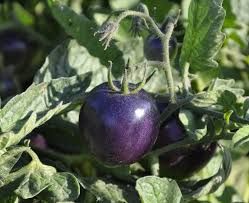UK Scientists Develop Purple Tomatoes with Amplified Nutritional Value

Purple tomatoes which fight cancer and last twice as long as their regular counterparts could soon be making their way to supermarket shelves in the UK.
The genetically modified (GM) tomato breed, equipped with anthocyanin, a powerful anti-oxidant found in blueberries, has been developed by UK scientists.
However the tomatoes are being grown in Canada, because the country's GM crop regulations are looser than those of the EU, and thus production is cheaper.
A first batch of tomato juice is ready to be shipped from Canada, with about 1200 litres due to be sent in Norwich. The juice will be used in research, and tested in the John Innes Centre before the tomaoes are approved for commercial use.
The John Innes Centre developed the GM tomatoes by transferring a single gene from snapdragon plant into the tomato genome. The fruit's dark colour is derived from its high level of anthocyanins.
The new breed will have double the usual shelf life of regular tomatoes, as the antioxidant slows down the development of rot and mould.
Researchers will also test the nutritional value in sauces and ketchups made from purple tomatoes, and hope that the health benefits will be passed on to the secondary products as well.
About £900,000 of EU grants went into funding the research, while the Biotechnology and Biological Sciences Research Council was also roped in for funding the project, according to the Daily Mail.
"We want to explore a way for consumers to benefit from our discoveries", Professor Cathie Martin, from the development laboratory, told the BBC. "There is a demand for the added health benefits.
"With these purple tomatoes you can get the same compounds that are present in blueberries and cranberries that give them their health benefits - but you can apply them to foods that people actually eat in significant amounts and are reasonably affordable."
Professor Martin has worked at Norfolk Plant Sciences, in collaboration with The Sainsbury Laboratory, to explore the commercial potential of plants with higher health benefits.
Prof Martin said that the Canadian regulations are "very enlightened", and they are more pragmatic on approval of GM crops.
"They look at the trait not the technology and that should be a way we start changing our thinking [in the UK] - asking if what you're doing is safe and beneficial, not 'Is it GM, and therefore we're going to reject it completely.'
"It is frustrating that we've had to go to Canada to do a lot of the growing and the processing.
"I hope this will serve as a vanguard product where people can have access to something that is GM but has benefits for them."
The juice from the purple tomatoes does not appear to pose any contamination risk by mutant genetic material, as the seeds have already been removed from it.
Professor Martin hopes that the purple tomato juice will be approved for sale in North America in about two years' time.
© Copyright IBTimes 2025. All rights reserved.





















